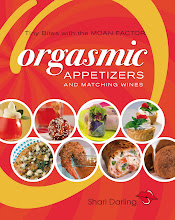
It seems food and wine lovers are becoming obsessed with the idea of buying local, quality and natural or preservative free products. It’s no wonder, then, that Ontario’s wineries are following suit, on the heels of California, and producing wines that are not filtered or, said properly, unfiltered. The question is are unfiltered wines really of better quality than fined and filtered ones? Or is this concept more of a marketing ploy?
First, what exactly, is an unfiltered wine? First, let’s look at the process called filtration. Filtration takes place after the juice has been fermented and the wine, racked off its lees or “sediment”, has been fined. Fining is a clarifying process. A small amount of gelatin or egg whites is mixed with a little wine and poured into the container. At some point, the albuminous matter coagulates the solids in the wine and falls to the bottom of the cask. This process can be done once or twice, depending on the winemaker’s style and choice. The wine is then pumped off of this sediment into a new container and then filtered. The wine is sent through filter pads, of varying degrees of thickness or thinness, to get rid of any remaining sediment. This leaves the resulting wine clear and bright and ready for maturation in vats, casks or bottles.
An unfiltered wine does not undergo filtration. The reason is that some winemakers or wine aficionados believe that filtration can strip a wine of significant important properties and flavours. These experts believe that an unfiltered wine retains more richness, body, colour and aging ability.
Other experts disagree; believing that filtration is necessary to avo id unnecessary risks, such as a secondary fermentation in the bottle and to ensure the wine will remain healthy and not go bad. Some also believe that filtering a wine does not really strip the wine of any noticeable elements. Opinions differ as to whether the idea of unfiltered wines is another marketing ploy.
id unnecessary risks, such as a secondary fermentation in the bottle and to ensure the wine will remain healthy and not go bad. Some also believe that filtering a wine does not really strip the wine of any noticeable elements. Opinions differ as to whether the idea of unfiltered wines is another marketing ploy.
Either way, many of Ontario’s wineries are producing filtered and unfiltered wines, thereby giving the general public the choice. You often see the title ‘unfiltered’ on the label, but little is said on the backside of the bottle as to what this actually means. My assumption is that most people would see the word ‘unfiltered’ and thereby feel justified in paying a $20.00 price or over.
Should you buy an unfiltered wine? It is really better than a filtered one? Opinions will always differ regarding this question. The level of filtration depends largely on the thickness of the filter itself. The thicker the filter, the more sediment is extracted from the wine and thereby also more of the wine’s character. Thinner filters strip less sediment and character. When buying wine the consumer does not know what kind of filter has been used on the wine by the winemaker. So, finding unfiltered wines with plenty of character is a matter of experimentation. In fact, it might be an idea to buy two bottles of the same grape variety, bottled and produced in the same year by the same winery -- a filtered an unfiltered one. Then, you can discover the differences for yourself. Do we want to drink unfiltered wines? Why not? Ontario has many. The enjoyment of wine is in the exploration and discovery of regions, grape varieties and winemaking styles. Just remember that unfiltered wines have more sediment left in the bottle, which means you may want to decant.
Unfiltered wines do provide a level of prestige, however, and will certainly impress guests who like to follow the latest trends. Personally, I have yet to discover any large differences in an unfiltered wine. For me the bottom line is not about whether a wine has been filtered or not; it is more about whether I like it, despite how it has been produced, and of course, the price I am willing to pay for a wine.
First, what exactly, is an unfiltered wine? First, let’s look at the process called filtration. Filtration takes place after the juice has been fermented and the wine, racked off its lees or “sediment”, has been fined. Fining is a clarifying process. A small amount of gelatin or egg whites is mixed with a little wine and poured into the container. At some point, the albuminous matter coagulates the solids in the wine and falls to the bottom of the cask. This process can be done once or twice, depending on the winemaker’s style and choice. The wine is then pumped off of this sediment into a new container and then filtered. The wine is sent through filter pads, of varying degrees of thickness or thinness, to get rid of any remaining sediment. This leaves the resulting wine clear and bright and ready for maturation in vats, casks or bottles.
An unfiltered wine does not undergo filtration. The reason is that some winemakers or wine aficionados believe that filtration can strip a wine of significant important properties and flavours. These experts believe that an unfiltered wine retains more richness, body, colour and aging ability.
Other experts disagree; believing that filtration is necessary to avo
 id unnecessary risks, such as a secondary fermentation in the bottle and to ensure the wine will remain healthy and not go bad. Some also believe that filtering a wine does not really strip the wine of any noticeable elements. Opinions differ as to whether the idea of unfiltered wines is another marketing ploy.
id unnecessary risks, such as a secondary fermentation in the bottle and to ensure the wine will remain healthy and not go bad. Some also believe that filtering a wine does not really strip the wine of any noticeable elements. Opinions differ as to whether the idea of unfiltered wines is another marketing ploy.Either way, many of Ontario’s wineries are producing filtered and unfiltered wines, thereby giving the general public the choice. You often see the title ‘unfiltered’ on the label, but little is said on the backside of the bottle as to what this actually means. My assumption is that most people would see the word ‘unfiltered’ and thereby feel justified in paying a $20.00 price or over.
Should you buy an unfiltered wine? It is really better than a filtered one? Opinions will always differ regarding this question. The level of filtration depends largely on the thickness of the filter itself. The thicker the filter, the more sediment is extracted from the wine and thereby also more of the wine’s character. Thinner filters strip less sediment and character. When buying wine the consumer does not know what kind of filter has been used on the wine by the winemaker. So, finding unfiltered wines with plenty of character is a matter of experimentation. In fact, it might be an idea to buy two bottles of the same grape variety, bottled and produced in the same year by the same winery -- a filtered an unfiltered one. Then, you can discover the differences for yourself. Do we want to drink unfiltered wines? Why not? Ontario has many. The enjoyment of wine is in the exploration and discovery of regions, grape varieties and winemaking styles. Just remember that unfiltered wines have more sediment left in the bottle, which means you may want to decant.
Unfiltered wines do provide a level of prestige, however, and will certainly impress guests who like to follow the latest trends. Personally, I have yet to discover any large differences in an unfiltered wine. For me the bottom line is not about whether a wine has been filtered or not; it is more about whether I like it, despite how it has been produced, and of course, the price I am willing to pay for a wine.





No comments:
Post a Comment